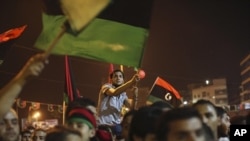The Libyan rebels' main western force is reported to be on the outskirts of Tripoli, while opposition fighters inside the capital claim they have taken control of several districts. Libyan leader Moammar Gadhafi remains defiant, even as the battle seems to move swiftly against him.
|
The Libyan Rebellion
|
Western rebels pushed quickly toward Tripoli on Sunday, overrunning barracks of the elite Khamis brigade, led by Mr. Gadhafi's son. Residents of the capital said gun battles continued during the day and explosions could be heard across the city.
In an audio address late Sunday, his second in 24 hours, Moammar Gadhafi said he was in Tripoli and vowed to remain with his people "until the end." He urged residents of the city to take up arms against the rebels, and promised that he and his supporters would win.
Hours earlier, government spokesman Moussa Ibrahim said the city is prepared for a rebel assault."Tripoli is well protected and we have thousands upon thousands of professional soldiers who are ready to defend this city," he said.
The rebel advance appears to pose the most significant challenge to Mr. Gadhafi in the six months of the uprising. It is unclear how much support the Libyan leader has in the capital. Foreign reporters moving toward Tripoli say rebel forces have been greeted by civilians with cheers and rebel flags.
An official with the opposition Transitional National Council in Benghazi said it has information that troops loyal to Moammar Gadhafi have abandoned their weapons and positions outside of the capital. He also spoke about rebel groups already in Tripoli.
Fathi Baji says rebels are approaching the Bab al-Aziza compound, Mr. Gadhafi's headquarters in Tripoli. That report could not be independently confirmed. Rebels to the east and south of Tripoli have consolidated recent gains and are trying to push on toward the capital.
Six months after the unrest began and after numerous set-backs, the rebels appear to be executing a coordinated effort to surround the capital. They have cut major supply routes, although government forces still hold several regions farther east and to the south.
Government spokesman Moussa Ibrahim called the rebels "armed gangs" whose success, he said, can be attributed to NATO help. "NATO has provided these rebels with weapons. This is not a secret. It is the weapons with which they are killing the Libyan people," he said.
NATO, working under a United Nations' mandate, has waged a five month air campaign against Libyan government forces, after loyalists tried to put down the wide-spread uprising. Analysts warn that NATO might face difficulties as the battle shifts to the capital, where the alliance has kept up airstrikes on military positions. Government forces in other towns have taken up posts in residential areas and are expected to do the same in Tripoli, home to at least a fourth of Libya's population.
Meanwhile, support for Moammar Gadhafi continues to erode. His former deputy, Abdel Salam Jalloud, has called on the people of Tripoli to rise up against the government. Jalloud is the third top defection reported in a week. And neighboring Tunisia, formerly neutral in the conflict, has announced it is recognizing the rebel leadership.




